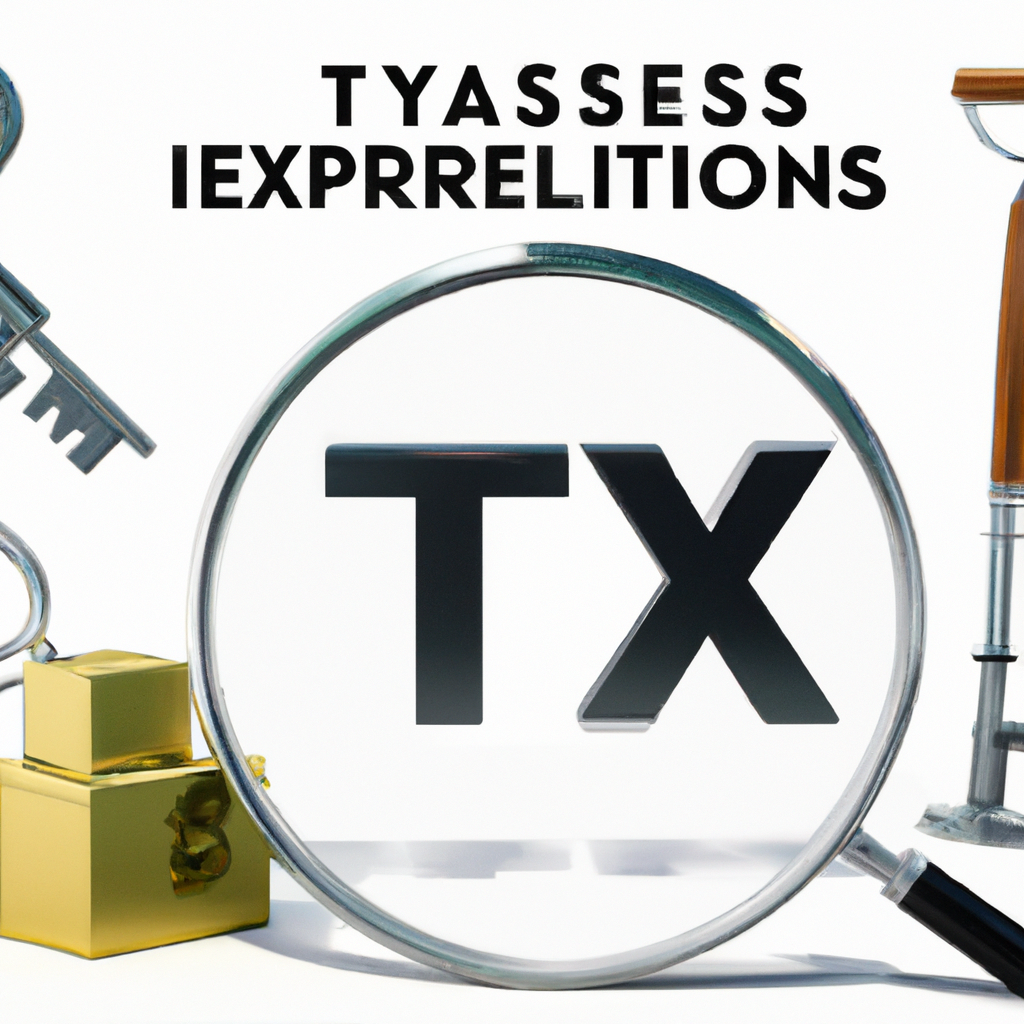Tax Considerations For Property Investors: Deductions And Strategies
September 27, 2023 | by Catherine Jones

Are you a savvy property investor looking to maximize your returns and minimize your tax bill? Look no further! In this article, we will explore the essential tax considerations for property investors, including valuable deductions and strategies that can help you make the most of your investment. Whether you’re a seasoned investor or just starting out, understanding the tax implications of property investment is crucial for long-term success. So grab a cup of coffee and let’s dive into the world of tax considerations for property investors!
Understanding Tax Implications for Property Investors

1.1 Importance of understanding tax implications for property investors
As a property investor, it is crucial to have a thorough understanding of the tax implications associated with your investments. Proper tax planning not only helps you maximize financial returns but also ensures compliance with relevant laws and regulations. By understanding the tax implications, you can make informed decisions regarding your investment strategy, minimize tax liability, and optimize your overall financial outlook.
1.2 Differences between personal and investment property taxes
It is important to distinguish between personal and investment property taxes. Personal property taxes refer to taxes levied on your personal belongings, such as cars or furniture. On the other hand, investment property taxes apply specifically to properties that you own and use for rental income or capital appreciation. Understanding these distinctions will allow you to accurately determine your tax obligations and take advantage of available deductions and exemptions.
1.3 Classification of rental income for tax purposes
Rental income generated from your investment properties is subject to taxation. It is essential to properly classify this income for tax purposes. Rental income can be categorized as either active or passive, depending on your level of involvement in property management. Active rental income involves direct participation in the day-to-day operations, while passive rental income refers to income generated from properties managed by a third-party property management company. The classification of your rental income will impact the tax deductions and credits you are eligible to claim.
1.4 Overview of tax deductions available for property investors
Tax deductions play a vital role in minimizing tax liability for property investors. Understanding the various deductions available can have a significant impact on your bottom line. Some common tax deductions for property investors include mortgage interest, property depreciation, repairs and maintenance, property management expenses, insurance premiums, travel expenses, home office expenses, legal and professional fees, advertising and marketing expenses, and utility costs. By taking advantage of these deductions, you can reduce your taxable income and potentially increase your cash flow.
1.5 Significance of tax planning and strategies for property investors
Tax planning and strategies are essential for property investors looking to optimize their investment returns. By carefully planning and strategically managing your taxes, you can take advantage of favorable tax laws and regulations. This can involve structuring property ownership for tax efficiency, utilizing tax-deferred investments like a 1031 exchange, leveraging self-directed individual retirement accounts (IRAs), understanding passive activity loss limitations, timing property sales to minimize capital gains tax, considering tax benefits for affordable housing, incorporating as an LLC or partnership for tax advantages, and implementing estate planning and inheritance tax strategies. These strategies can help property investors minimize tax burdens and maximize their after-tax returns.
Tax Deductions for Property Investors
2.1 Mortgage Interest Deduction
One of the most significant tax deductions available to property investors is the mortgage interest deduction. This deduction allows you to deduct the interest paid on your mortgage loans used to acquire, improve, or refinance your investment properties. By claiming this deduction, you can reduce your taxable income and potentially lower your overall tax liability. It is important to keep detailed records of the mortgage interest paid throughout the year to accurately claim this deduction.
2.2 Property Depreciation Deduction
Property depreciation is another valuable deduction for property investors. Depreciation refers to the gradual loss of value of your investment property over time due to wear and tear, deterioration, or obsolescence. The IRS allows property investors to deduct a portion of the property’s value each year as depreciation expense. This not only helps offset rental income but also provides potential tax savings. It is important to understand the specific depreciation methods and recovery periods applicable to different types of investment properties to maximize this deduction.
2.3 Repairs and Maintenance Deduction
Property owners are also eligible to deduct expenses related to repairs and maintenance on their investment properties. Repairs and maintenance expenses refer to the costs incurred to keep the property in good operating condition. These expenses can include plumbing repairs, electrical maintenance, painting, and other necessary repairs. By deducting these expenses, property investors can reduce their taxable income and potentially increase their cash flow.

2.4 Property Management Expenses Deduction
If you enlist the services of a property management company to handle the day-to-day operations of your investment properties, you can deduct the fees paid for their services. Property management expenses may include fees for tenant screening, rent collection, property maintenance, and other management-related tasks. By deducting these expenses, you can lower your taxable income and offset the costs associated with professional property management.
2.5 Insurance Premiums Deduction
Insurance premiums paid on your investment properties are deductible for tax purposes. Property investors can deduct the costs of property insurance, liability insurance, and any other insurance policies directly related to their rental properties. It is essential to keep accurate records of insurance premiums paid throughout the year to claim this deduction accurately.
2.6 Travel Expenses Deduction
Property investors often incur travel expenses related to the management and maintenance of their investment properties. These expenses can include transportation costs, lodging, meals, and other necessary travel expenses. By properly documenting and deducting these travel expenses, property investors can lower their taxable income and potentially increase their profitability.
2.7 Home Office Deduction
Property investors who utilize a home office for their investment activities may be eligible for a home office deduction. To claim this deduction, the home office must be used exclusively for business purposes and be the primary place of business. By claiming a home office deduction, property investors can deduct a portion of their home-related expenses, such as mortgage interest, property taxes, insurance, utilities, and maintenance costs. This deduction can provide significant tax savings for property investors who operate their investment activities from a home office.

2.8 Legal and Professional Fees Deduction
Legal and professional fees incurred in relation to your investment properties are generally tax-deductible. These fees may include attorney fees for lease agreements or evictions, accounting fees for tax preparation and financial management, and other professional fees directly related to your real estate investment activities. Documenting and properly categorizing these fees is essential for accurate tax reporting and claiming the deduction.
2.9 Advertising and Marketing Expenses Deduction
Expenses related to advertising and marketing your rental properties are tax-deductible. These expenses may include online listing fees, website development costs, print advertisements, and signage. By deducting these expenses, property investors can offset their taxable income and potentially attract more tenants to their properties, thereby increasing their rental income.
2.10 Utility Costs Deduction
Utility costs, such as electricity, water, gas, and trash removal fees, incurred for your investment properties can also be deducted for tax purposes. These costs can add up significantly, especially for properties with multiple units. Deducting these expenses can help property investors lower their taxable income and maintain profitability.
Tax Planning Strategies for Property Investors
3.1 Holding vs. Flipping Properties: Tax Implications
Property investors need to consider the tax implications of their investment strategies, whether they focus on holding properties for long-term rental income or flipping properties for short-term profits. Holding properties for the long term may provide tax advantages such as depreciation deductions and the potential for long-term capital gains treatment. On the other hand, flipping properties for short-term profits may incur higher tax rates as ordinary income. Understanding the tax implications of different investment strategies can inform decision-making and help maximize after-tax returns.

3.2 Structuring Property Ownership for Tax Efficiency
The way you structure the ownership of your investment properties can have significant tax implications. For example, holding properties in a limited liability company (LLC) or partnership can provide tax advantages, such as increased flexibility in allocating income and deductions among owners. Additionally, structuring ownership through trusts or family limited partnerships can offer estate planning benefits. Properly structuring property ownership can help property investors minimize taxes and protect their assets.
3.3 1031 Exchange and Tax-Deferred Investments
A 1031 exchange is a tax-deferred investment strategy that allows property investors to sell a property and reinvest the proceeds in another like-kind property. By utilizing a 1031 exchange, property investors can defer paying capital gains taxes on the sale of the original property. This strategy provides the opportunity to preserve capital and potentially increase investment returns by deferring tax payments. Understanding the specific rules and requirements of a 1031 exchange is crucial for successful implementation.
3.4 Utilizing Self-Directed Individual Retirement Accounts (IRAs)
Self-directed individual retirement accounts (IRAs) offer property investors an additional tax-advantaged investment opportunity. By utilizing a self-directed IRA, you can invest in real estate directly through your retirement account. This allows you to benefit from tax advantages such as tax-deferred or tax-free growth on rental income and capital gains. Additionally, you can use a self-directed IRA to invest in alternative real estate assets, such as private mortgages or real estate investment trusts (REITs). Understanding the rules and regulations surrounding self-directed IRAs is essential for leveraging this tax-efficient investment strategy.
3.5 Passive Activity Loss Limitations and Real Estate Professional Status
The IRS imposes passive activity loss limitations on property investors who do not qualify as real estate professionals. These limitations restrict the deductibility of losses generated from rental activities, especially if you have other sources of income. However, real estate professionals who meet certain criteria can potentially overcome these limitations and fully deduct losses related to their rental properties. Understanding the requirements to qualify as a real estate professional and navigating the passive activity loss rules can help property investors optimize their tax deductions.

3.6 Timing of Property Sales and Capital Gain Tax
The timing of property sales can have significant implications for capital gain tax. Property investors can potentially reduce their tax liability by strategically timing the sale of their properties. Long-term capital gains tax rates are generally lower than short-term rates. By holding an investment property for more than one year, property investors may qualify for long-term capital gains treatment and pay a lower tax rate on the profit. Understanding the tax implications of different holding periods can help property investors determine the optimal time to sell their properties.
3.7 Consideration of Tax Benefits for Affordable Housing
Investing in affordable housing can provide property investors with various tax benefits. The government offers incentives such as low-income housing tax credits, which can offset a portion of the costs associated with developing or renovating affordable housing units. These tax benefits can help property investors create sustainable and socially impactful investments while potentially providing attractive financial returns. Understanding the eligibility criteria and qualifying regulations for affordable housing tax incentives is essential for maximizing tax benefits.
3.8 Incorporating as an LLC or Partnership for Tax Advantages
Incorporating your property investment activities as an LLC or partnership can provide tax advantages. These business entities offer increased flexibility in terms of income and deduction allocation, liability protection, and potential tax savings through pass-through taxation. By setting up the appropriate business structure, property investors can optimize their tax planning and potentially reduce their overall tax liability. Consulting with a qualified tax professional is recommended to ensure compliance and maximize tax benefits.
3.9 Estate Planning and Inheritance Tax Strategies
Estate planning is a crucial aspect of long-term property ownership and transfer of assets. Proper estate planning can help property investors minimize estate tax liabilities and ensure a smooth transition of property ownership to future generations. Strategies such as establishing trusts, gifting properties, and leveraging available exemptions can help property investors preserve their wealth, protect their assets, and minimize tax implications for their heirs. Seeking guidance from an experienced estate planning attorney or financial advisor is advised when implementing estate planning strategies.
3.10 Utilizing Tax Credits and Incentives for Property Investments
Various tax credits and incentives are available to property investors, ranging from energy-efficient property credits to historic preservation credits. These credits can provide significant tax savings and encourage investment in specific areas or property types. Understanding the eligibility criteria and necessary documentation for claiming these tax credits is essential. By taking advantage of tax credits and incentives, property investors can reduce their tax liability and potentially increase the overall profitability of their investments.
Compliance and Record-keeping for Property Investors
4.1 Importance of maintaining accurate records
Maintaining accurate records is crucial for property investors to ensure compliance with tax laws and regulations. Accurate records help substantiate your deductions, provide proof of expenses, and support your overall tax reporting. It is essential to keep thorough records of income, expenses, property transactions, and any relevant supporting documents. Proper record-keeping not only facilitates tax compliance but also simplifies audits, if necessary.
4.2 Required tax forms for property investors
Property investors may be required to file certain tax forms to report their rental income and claim deductions. The most common forms include Schedule E, which is used to report rental income and expenses, and Form 4562, which is used to claim depreciation deductions. Depending on the specific circumstances, property investors may also need to file additional forms such as Form 8825 for reporting rental real estate income and Form 4797 for reporting sales of investment properties. Understanding the appropriate tax forms and deadlines is essential for accurate tax reporting.
4.3 Organizing receipts and documents for tax purposes
Organizing receipts and other relevant documents is essential for simplifying tax compliance and maximizing deductions. Property investors should maintain organized records of all income and expense-related documents, including rent receipts, invoices, bank statements, property tax bills, insurance records, and any other supporting documentation. By organizing these documents in a systematic manner, property investors can easily substantiate their tax deductions and minimize the risk of errors or omissions.
4.4 Hiring a tax professional for property investment taxation
Navigating the complex tax landscape of property investment can be challenging and time-consuming. Consider hiring a qualified tax professional who specializes in property investment taxation to ensure compliance and maximize tax benefits. An experienced tax professional can provide valuable advice, assist with tax planning strategies, prepare your tax returns accurately, and help you stay updated with relevant laws and regulations. The expertise of a tax professional can save you time, money, and potential headaches in the long run.
4.5 Utilizing technology for streamlined tax compliance
Advancements in technology have made record-keeping and tax compliance more streamlined for property investors. There are various software and cloud-based platforms available that can simplify the process of tracking income, expenses, and other relevant financial data. These tools can automate calculations, generate reports, and facilitate accurate tax reporting. By utilizing technology, property investors can streamline their tax compliance efforts, reduce the risk of errors, and save time in managing their financial records.
4.6 Staying updated with tax laws and regulations
Tax laws and regulations are subject to change, and it is essential for property investors to stay updated with any relevant updates. Changes in tax laws can impact deductions, exemptions, and other tax planning strategies. Subscribing to newsletters, following reputable tax resources, and consulting with a tax professional can help property investors stay informed about any changes that may affect their tax obligations. By remaining updated, property investors can ensure compliance and proactively adapt their tax strategies to maximize benefits.
In conclusion, understanding the tax implications for property investors is essential for optimizing returns and ensuring compliance. By comprehending the distinctions between personal and investment property taxes, classifying rental income correctly, and familiarizing oneself with available tax deductions, property investors can reduce their tax liabilities and increase cash flow. Implementing tax planning strategies, such as structuring property ownership efficiently, utilizing tax-deferred investments, and staying informed about tax laws, can further enhance financial outcomes. Proper compliance and record-keeping, along with the support of qualified tax professionals and technology tools, contribute to accurate tax reporting and minimization of audit risks. By proactively managing tax implications, property investors can effectively navigate the tax landscape and maximize the benefits of their real estate investments.
RELATED POSTS
View all


